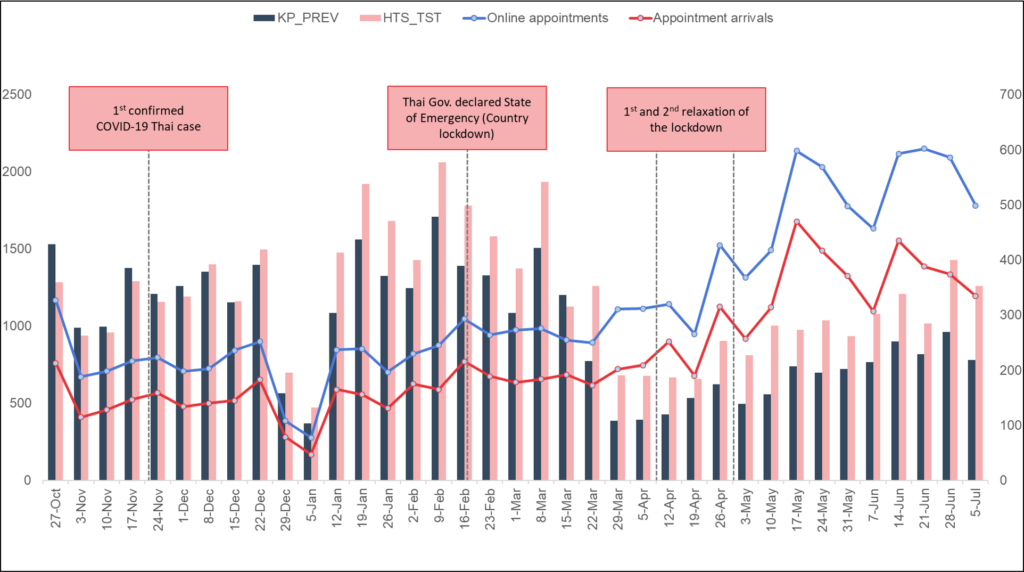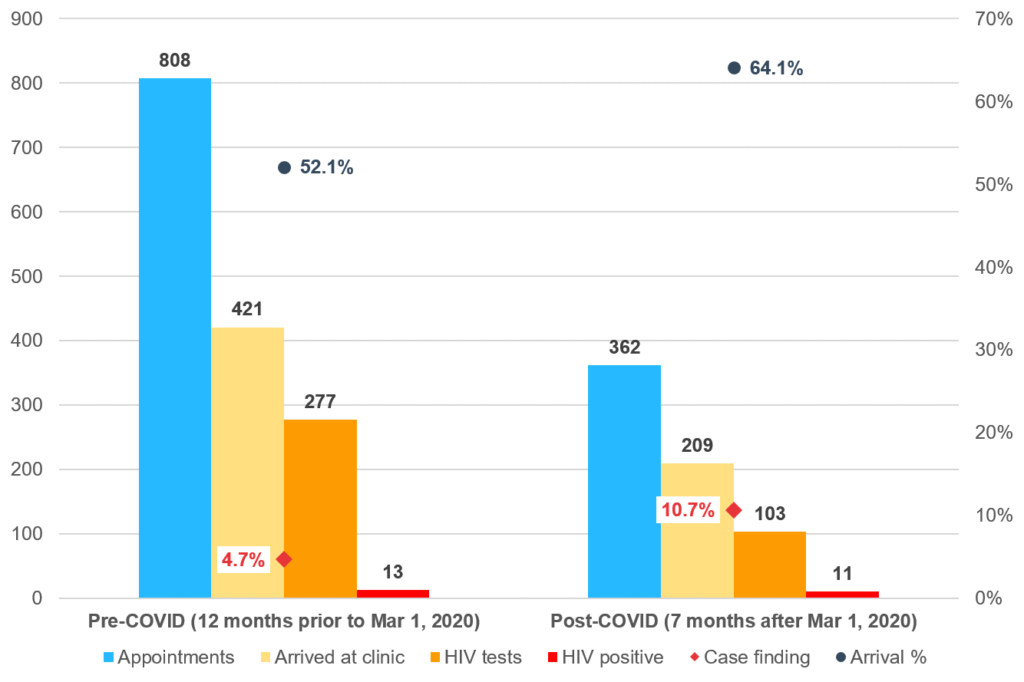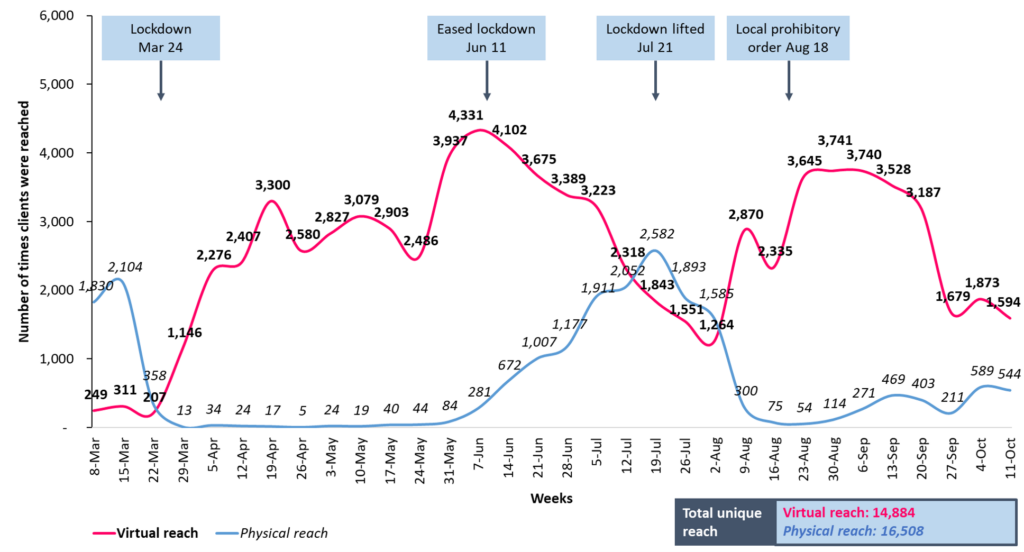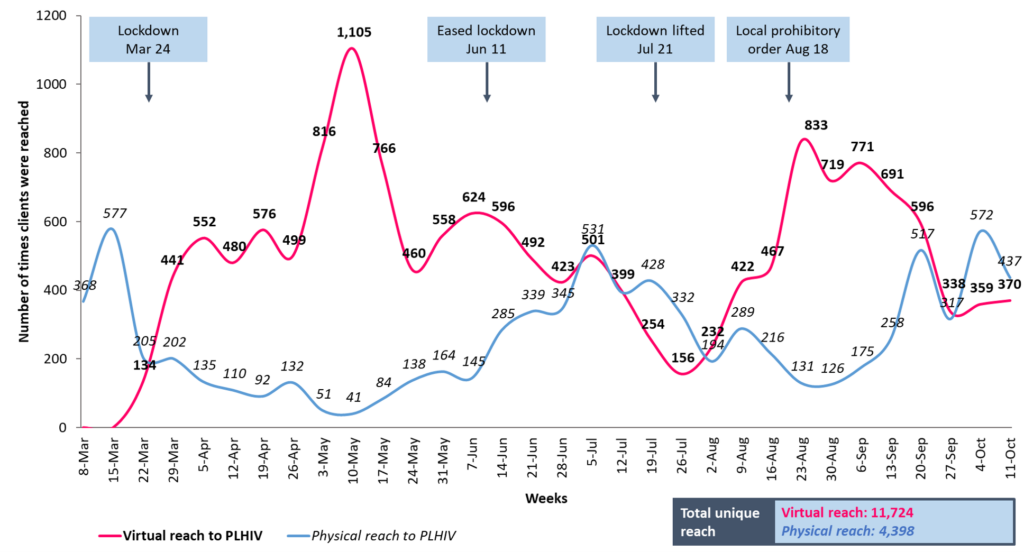Aubrey Weber, Technical Officer, Research Utilization, FHI 360
Benjamin Eveslage, Technical Advisor, Online HIV Services, FHI 360
Adapting to the “new normal” of COVID-19 has dramatically impacted our daily lives and routines. For HIV programs, this has required shifting many aspects of service delivery to online platforms—also called telehealth—so that services can be provided safely at a distance.
To promote more inclusive, convenient, and client-centered HIV services, the USAID- and PEPFAR-supported LINKAGES and EpiC projects have been providing HIV services virtually since 2018 as part of their Going Online portfolio. No one could have predicted what the year 2020 would bring, but this foundational work provided several countries the tools and resources necessary to preserve HIV services during COVID-19. Here are examples from four countries making this happen.
Thailand
In Thailand, TestMeNow allows individuals to easily and discretely make an appointment online to receive an HIV test at one of 16 community-based or private-sector clinics across eight major cities. Even before COVID-19, community partners consistently achieved high HIV case finding among clients reached online and booked through TestMeNow. During Thailand’s nationwide lockdown, which began in March 2020, physical outreach and testing uptake declined significantly, but online reservations and arrivals increased as the program shifted focus to online outreach and demand generation (Figure 1). As a result, the COVID-19 pandemic period in Thailand was the first time the absolute number of HIV-positive cases detected through online recruitment efforts surpassed those reached by physical outreach (Figure 2). LINKAGES Thailand also worked in collaboration with provincial health offices and used data collected via TestMeNow and the eCascade real-time patient tracking system to message almost 4,000 HIV-positive patients with updated treatment information, contributing to a loss-to-follow-up rate among antiretroviral therapy (ART) patients during the lockdown period of less than 0.5%. Finally, the project introduced a “telemedicine” model in which existing pre-exposure prophylaxis (PrEP) clients completed counseling via phone or video chat, chose a private/public HIV testing site convenient to them, and submitted HIV testing results electronically, after which LINKAGES provided PrEP refill via postal or messenger service.
Figure 1. Weekly trend of overall number of clients reached (KP_PREV) and tested (HST_TST) by the LINKAGES project in Thailand (left axis) and number of online appointments and clients who arrived for their online appointment (right axis)
Figure 2. Percent contribution of HIV case finding by modality, including TestMeNow (March 15–July 28, 2020)
Eswatini
Together Realizing Ubuntu Eswatini (TRUE), available at TrueEswatini.com, allows people to find and schedule confidential sexually transmitted infection (STI) and HIV services in Eswatini, including testing, initiation on antiretroviral therapy (ART) and PrEP, treatment for STIs, cervical cancer screening, and treatments for noncommunicable diseases. When the site was launched in March 2020, it was first used for booking mobile HIV services, but was quickly scaled when many people could not travel to access their normal HIV service providers. Due to COVID-19, TRUE began offering ART and PrEP refills, including at convenient pickup locations and through home visits. TRUE also began offering booking for virtual psychosocial counseling. While the number of appointments booked ranged from 16 to 56 between March and June, the expanded service options and additional online marketing resulted in 370 bookings in July and 607 in August.
Kenya
In Nairobi, Kenya, the EpiC project uses a similar online reservation app called Step1.co.ke, which was launched March 2019, a year before COVID-19. The circumstances of COVID-19 have led clients—who would otherwise go to a nearby community clinic for HIV testing when they feel at risk—to book an appointment on Step1. Between March 2019 and March 2020, HIV case finding for clients reached directly through Step1 hovered around 5%. Since then, HIV case finding among Step1 users has doubled to just over 10%, suggesting that Step1 is successfully supporting clients at high risk or with recent exposure to access HIV testing and be linked to additional services based on their HIV status. While the same community partners and clinics in Kenya offered services before and during COVID-19, outreach teams in the field reduced their activities, while online outreach workers continued to reach clients virtually. A comparison of HIV case finding before and after COVID-19 is shown in Figure 3.
Figure 3. Results of online HIV outreach in Kenya using Step1.co.ke before and after COVID-19
Nepal
When Nepal’s nationwide lockdown order first went into effect March 24, the LINKAGES Nepal team began using virtual case management methods—including adapting the existing MeroSathi online risk assessment and HIV testing reservation app—to reach people living with HIV (PLHIV) online with adherence and retention support and provide home delivery of ARV drugs. The project was able to quickly apply many lessons from a long history of providing HIV prevention services online to increase prevention and treatment support through virtual channels during COVID-19. Approaches included increasing phone chats between provider and client, offering virtual support group meetings, and using digital social and behavior change materials and messages to provide information about ART. In addition, peer champions, case management teams, and community-based supporters were mobilized to deliver ARV drugs directly to clients’ homes and motivate PLHIV to maintain treatment regimens while keeping a physical distance from clinics, which also minimized patient flow at the clinic. The project’s HIV outreach shifted almost entirely online during the lockdown and has continued mostly as such (Figure 4). Case management support for PLHIV also shifted online for about 75% of clients from March 22 to October 16, 2020 (Figure 5).
Figure 4. Weekly trend of HIV prevention outreach during COVID-19
Figure 5. Weekly trend of virtual reach to PLHIV during COVID-19
To date, about 35 countries across Africa and Asia have received technical assistance from LINKAGES and EpiC staff to implement Going Online approaches. Twelve of these countries are already using an online reservation app, while an additional 12 are starting to use QuickRes.org, a first-of-its-kind app for multicountry online reservation and case management. While the introduction and use of telehealth and online HIV services can be traced back years, the COVID-19 pandemic has put a spotlight on these approaches to become the “new normal.”
Header Photo: Unsplash






